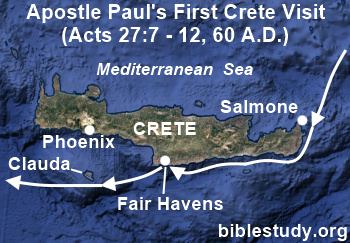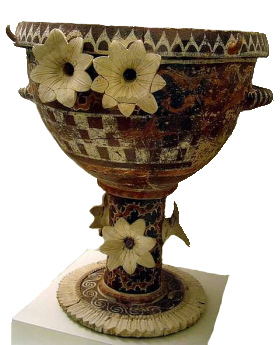Titus is also considered the patron saint of the United States Army Chaplain Corps.
A Good Theme
Paul's short letter to Titus, in the King James, uses the word "good" 11 times in just 10 verses!
[What Does It Mean to Be Holy?]
One of the primary themes of Titus is good works. Paul warned of those who, although they profess belief in God, possess defiled consciences and are reprobate concerning good works (Titus 1:16). Paul also admonished his friend to be a pattern of good works for others to follow.
In all things shewing thyself a pattern of good works: in doctrine shewing uncorruptness, gravity, sincerity . . . (Titus 2:7).
Christians, in general, should always be zealous for good works (Titus 2:14, 3:1, 8, 14).
Titus Traditions
Some interesting traditions involving Titus exist regarding his life, ministry and death.
"One Greek legend says that he was the nephew of a proconsul of Crete, another that he was descended from Minos. The cathedral of Megalo-Castron on the north of the island was dedicated to him. His name was the watch-word of the Cretans, when they fought against the Venetians, who came under the standard of St. Mark.
"The Venetians themselves, when here, "seem to have transferred to him (Titus) part of that respect, which, elsewhere, would probably have been manifested for Mark alone." " (Life and Epistles of St. Paul, pg. 759).
One tradition has Titus dying and being buried in Gortyna on Crete in either 96 or 107 A.D.
Tradition also states that Titus' head, during an invasion in 824 A.D., was taken to Venice, Italy and placed in St. Mark's Basilica. It was later returned to Crete in 1966 A.D. and venerated. His head is now located at the island's Cathedral of Saint Titus, also known as Hagios Titos, located in Heraklion.
Paul's First Visit to Crete
Apostle Paul's first visit to Crete was not in 63 A.D. when he came to the island to help Titus. It was an accidental visit in 60 A.D. on his way to Rome!

[How Often Was Paul Arrested?]
Paul, as a Roman prisoner, is on a ship bound for Rome to have his case heard by Caesar. The ship, unable to take a more direct route to Italy, is forced to sail south to the island of Crete. It ends up docking at a southern-facing location known as The Fair Havens.
And when we had sailed slowly many days, and scarce were come over against Cnidus, the wind not suffering us, we sailed under Crete, over against Salmone; And, hardly passing it, came unto a place which is called The Fair Havens . . . (Acts 27:7 - 8).
[Paul's Fourth Missionary Journey]
Paul's ship stays at Fair Havens until after the Day of Atonement which fell on September 24th in 60 A.D. It then tries to foolishly sail to Rome during a treacherous time of year known for stormy weather and winds on the Mediterranean (Acts 27:9 - 13). The ship is blown off course and forced south of the island of Clauda, after which it wanders the sea aimlessly for two weeks until being shipwrecked near Malta (Acts 28:1)!
Epistle of Pseudo-Titus
The epistle of Pseudo-Titus is a non-canonical book attributed to Titus. The oldest manuscript dates back only to the 8th century A.D.
[Is the Book of Enoch Inspired?]
The book encourages a life of chastity and goes so far as to condemn sexual activity even within marriage. This uninspired book also contains a story of Peter blessing a gardener's daughter.
The Island of Crete
Crete, the place where Paul and Titus ministered, is considered a modern day possession of Greece. It is the most populous of the many Greek islands with a 2021 population estimated at 624,000.

Crete is also the largest of the Greek isles with an area of 8,450 square kilometers (3,260 square miles). It is the fifth largest island in the Mediterranean Sea.
Crete was the home of the Minoan civilization, a Bronze Age people who built what some regard as Europe's first civilization. The Minoans, especially at their palace city of Knossos, were a highly creative and literate people known for their large structures and unique art.
Crete was conquered by Rome in 69 B.C. It and its capital city of Gortyn became part of the Roman province called Crete - Cyrenaica.
The Most Productive
Apostle Paul arguably had the shortest yet most productive period of any Biblical writer! In the span of less than three years, from early 61 to (and including) 63 A.D., he wrote an astonishing seven Biblical books!
[Where Was the Bible Written?]
Paul wrote, while a prisoner in Rome, the books of Ephesians, Philippians, Colossians, Philemon and Hebrews. When he was acquitted and released from a Roman prison in 63, he penned both 1Timothy and Titus.